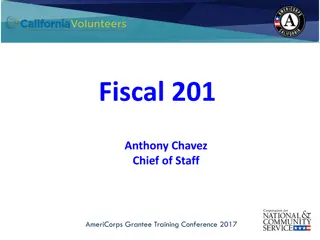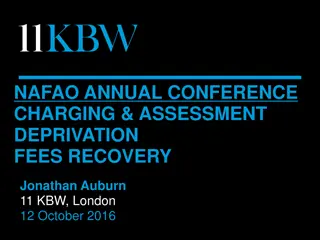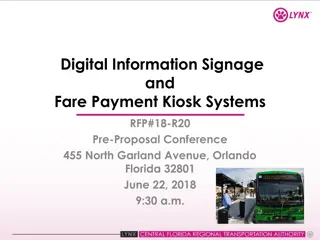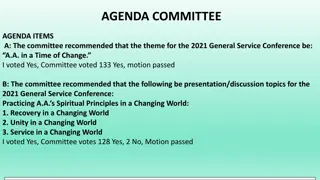
Improving Adult Social Care Charging: Local Areas' Challenges
Explore the challenges and potential improvements in the implementation of adult social care charging under the 2014 Care Act. Learn about concerns in local areas, issues with current regulations, and possible non-legislative actions to enhance the system. Join the discussion on reforming social care for a sustainable and quality-focused future.
Download Presentation

Please find below an Image/Link to download the presentation.
The content on the website is provided AS IS for your information and personal use only. It may not be sold, licensed, or shared on other websites without obtaining consent from the author. If you encounter any issues during the download, it is possible that the publisher has removed the file from their server.
You are allowed to download the files provided on this website for personal or commercial use, subject to the condition that they are used lawfully. All files are the property of their respective owners.
The content on the website is provided AS IS for your information and personal use only. It may not be sold, licensed, or shared on other websites without obtaining consent from the author.
E N D
Presentation Transcript
Charging for adult social care under the 2014 Care Act: How are things working in local areas and what could be done better or differently? Lee McGill Senior Policy Manager Social Care Charging & Funding Reform (with Katy Lindfield from the same team) NAFAO Conference 18thOctober 2017 Birmingham 1
Plans for the ASC consultation The Government is committed to listening to people s views on how to reform the social care system, to ensure it is sustainable for current and future generations and that the quality of care improves. We have committed to a wide and open consultation on our proposals, and want to work collaboratively with partners on these critical issues. The exact format of the consultation will be determined in due course. The Prime Minister has been clear that there will be a full and open engagement on the issues, and that people will have opportunities to put forward their views. The Government wants to ensure there is a balanced package that supports quality and dignified care, as well as financial sustainability, in the future. The Government will make further announcements on the scope of the consultation in due course. 2 DH Leading the nation s health and care
We know you have concerns with the system now Putting caps, capital limits and homes in the means test aside for a moment: Loss of HASSASSA powers and the unsecured debt that many LAs are carrying. LA powers to recover debt. The treatment of Universal Credit and how it should be assessed. Frustration at not being able to take account of injury compensation awards in the vast majority of cases. Trusts and deprivation of assets , particularly in relation to safeguarding issues (e.g. families taking money from relatives). Concerns as to how disability-related expenditure is calculated. A reminder that there were weaknesses/anomalies/ errors in the charging regulations and guidance which needed updating. 3 DH Leading the nation s health and care
What could be done in the meantime? Assuming that any wholesale major legislative changes impacting ASC, including some much needed and long-awaited improvements to the charging regulations, would need to await the outcome of the ASC consultation, is there anything that could be done (ideally without the need for legislation) in the shorter-term order to improve the operation/implementation of the charging rules? Two areas that DH has been particularly interested in are deferred payment agreements and deliberate deprivation, both of which have been the subject of DH deep dives with selected LAs this year. Those two areas may offer fertile ground for non-legislative action but there may be others too. 4 DH Leading the nation s health and care
Deferred payment agreements (DPAs): Messages from selected LAs Take-up has decreased since the Care Act 2014 which allowed LAs to charge interest on DPAs and admin fees. Data on take-up and the eligible population varies greatly between areas. There is an unknown group of self-funders not in contact with the LA who may be eligible for DPAs but are not currently being reached/aware. Interest charges were identified as the biggest barrier to take-up. There is considerable variation in how admin fees and interest are calculated and charged. Advice given to service users can be confusing. LAs have discretion to offer DPAs in complex cases or to people who narrowly miss eligibility, but are reluctant to use it. Lack of capacity, joint ownership and the property not being registered typically cause long delays and in some cases can make it impossible to place a charge on a house. 5 DH Leading the nation s health and care
DPAs: Possible actions Support development of best practice in offering DPAs e.g. calculation of administrative fees, using discretionary powers to offer DPAs in a range of circumstances, taking a pro-active approach to offering DPAs. Seek further insight into why DPAs are less attractive than anticipated. Possibly through the Cabinet Office s behavioural insight team? Work with private equity release market to encourage that market to be more competitive as a viable alternative to DPAs. Work with mortgage providers to ensure they allow further charges on the property. Run an awareness campaign on the DPA offer, including how attractive the interest rate is Increase awareness of the importance of taking out power of attorney Develop model legal charge document with LAs and Land Registry to reduce delays. 6 DH Leading the nation s health and care
Deliberate Deprivation: Messages from selected LAs 6/8 local authorities said they do not do enough, or are not able to do enough, to identify deliberate deprivation. There is variation in how proactively local authorities seek to identify it, but most lack confidence that they know of all or even most potential cases. Local authorities are not required to collect data on deliberate deprivation and so are unsure of the scale of the problem. Local authorities report that once they have suspected and proven deliberate deprivation they are confident in their ability to recover the funds. As cases rarely make it to court, there appears to be little incentive for service users not to try to use deliberate deprivation to avoid care costs. 7/8 local authorities were aware of businesses promoting services to help people deliberately deprive themselves. 7 DH Leading the nation s health and care
Deliberate deprivation: Possible actions Capability building, perhaps working closely with HMRC as well as LAs, and building on behavioural insights on deliberate deprivation, to develop and share best practice . Increase data sharing, although this may require legislation if we require data from HMRC for example. National level work, including with ASA and TSI, to clarify the legality of (a) the practices of companies advising people how to avoid ASC care costs and b) how they are advertised. Work to explore the potential and advantages of starting a voluntary or mandatory collection on deliberate deprivation. Explore introduction of similar sanctions to those imposed by HMRC in response to non-payment (although this would require legislation). 8 DH Leading the nation s health and care
Questions for delegates/tables 1. What changes would you like to see in the area of deferred payment agreements?: Non-legislative (short-to-medium term) Legislative (medium-to-long term) 2. What changes would you like to see in the area of deliberate deprivation?: Non-legislative (short-to-medium term) Legislative (medium-to-long term) 3. What other changes would you like to see in relation to ASC charging? 9 DH Leading the nation s health and care
Thank you! lee.mcgill@dh.gsi.gov.uk katy.lindfield@dh.gsi.gov.uk 10 DH Leading the nation s health and care






















